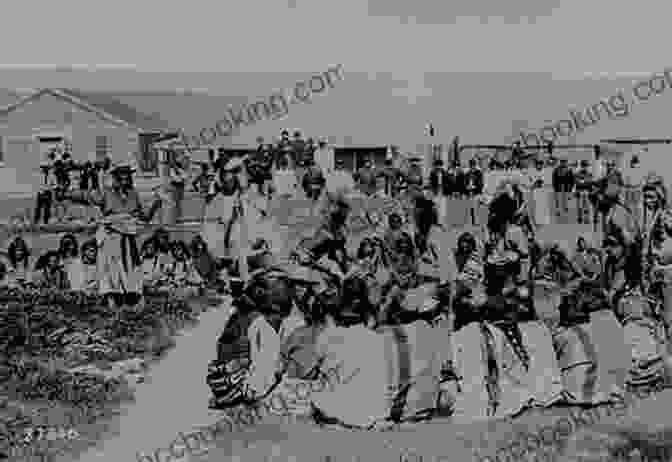Why Native Americans Got Pushed to the Very Front: A Historical and Cultural Exploration

****
The history of Native Americans in the United States is a complex and often tragic one. From the first contact with European settlers to the present day, Native Americans have faced a relentless tide of discrimination, oppression, and violence. One of the most visible manifestations of this oppression has been the forced relocation of Native Americans to reservations, a policy that has had a devastating impact on their communities and cultures.
5 out of 5
| Language | : | English |
| File size | : | 1668 KB |
| Text-to-Speech | : | Enabled |
| Screen Reader | : | Supported |
| Enhanced typesetting | : | Enabled |
| Word Wise | : | Enabled |
| Print length | : | 17 pages |
| Lending | : | Enabled |
In this article, we will explore the history of Indian reservations in the United States, from their origins in the 19th century to their continued existence today. We will also examine the impact of reservations on Native American communities and cultures, and we will discuss the ongoing debate over their future.
**The Origins of Indian Reservations**
The creation of Indian reservations in the United States began in the 19th century, as the United States government sought to control the expansion of Native American tribes and to acquire their land. The first reservations were established in the 1830s, as part of the Indian Removal Act, which forced thousands of Native Americans to relocate from their traditional homelands to reservations west of the Mississippi River.
Over the next several decades, the United States government continued to establish reservations, often through treaties with Native American tribes. These treaties typically ceded large amounts of land to the United States, in exchange for the establishment of a reservation where the tribe would be allowed to live.
By the late 19th century, there were over 300 Indian reservations in the United States, home to over 250,000 Native Americans. Reservations were typically located in remote and arid regions, far from the centers of white settlement. This isolation made it difficult for Native Americans to access education, healthcare, and other essential services.
**The Impact of Reservations on Native American Communities**
The establishment of Indian reservations had a devastating impact on Native American communities. The forced relocation from their traditional homelands disrupted their cultures and way of life. Many Native Americans died from diseases or starvation during the journey to reservations, and those who survived often faced harsh conditions and poverty on the reservations.
Reservations also undermined Native American sovereignty. The United States government exerted control over reservations through a system of Indian agents, who were appointed to oversee the tribes. Indian agents often abused their authority, and they often implemented policies that were detrimental to the tribes.
In addition, the establishment of reservations led to the loss of vast amounts of Native American land. By the early 20th century, Native Americans had lost over 90% of their original landholdings. This loss of land had a devastating impact on Native American economies and cultures.
**The Ongoing Debate over the Future of Reservations**
The debate over the future of Indian reservations continues to this day. Some Native American leaders argue that reservations are essential to the preservation of their cultures and sovereignty. Others argue that reservations are a form of oppression, and that they should be abolished.
There are a number of different proposals for the future of reservations. Some have proposed that reservations should be given more autonomy, while others have proposed that they should be abolished and that Native Americans should be fully integrated into American society.
The debate over the future of reservations is a complex one, with no easy answers. However, it is important to remember that Indian reservations are home to hundreds of thousands of Native Americans, and that any decision about their future must be made with their input and consent.
****
The history of Indian reservations in the United States is a complex and tragic one. Reservations have had a devastating impact on Native American communities and cultures, and they continue to be a source of debate today. However, it is important to remember that reservations are home to hundreds of thousands of Native Americans, and that any decision about their future must be made with their input and consent.
**Image**

**Keywords**
* Native American * Indian reservations * United States * Forced relocation * Discrimination * Oppression * Culture * Sovereignty
5 out of 5
| Language | : | English |
| File size | : | 1668 KB |
| Text-to-Speech | : | Enabled |
| Screen Reader | : | Supported |
| Enhanced typesetting | : | Enabled |
| Word Wise | : | Enabled |
| Print length | : | 17 pages |
| Lending | : | Enabled |
Do you want to contribute by writing guest posts on this blog?
Please contact us and send us a resume of previous articles that you have written.
 Book
Book Novel
Novel Page
Page Chapter
Chapter Text
Text Story
Story Genre
Genre Reader
Reader Library
Library Paperback
Paperback E-book
E-book Magazine
Magazine Newspaper
Newspaper Paragraph
Paragraph Sentence
Sentence Bookmark
Bookmark Shelf
Shelf Glossary
Glossary Bibliography
Bibliography Foreword
Foreword Preface
Preface Synopsis
Synopsis Annotation
Annotation Footnote
Footnote Manuscript
Manuscript Scroll
Scroll Codex
Codex Tome
Tome Bestseller
Bestseller Classics
Classics Library card
Library card Narrative
Narrative Biography
Biography Autobiography
Autobiography Memoir
Memoir Reference
Reference Encyclopedia
Encyclopedia Robert Sky Allen Ph D
Robert Sky Allen Ph D Tim Leffel
Tim Leffel Samra Habib
Samra Habib Michael D Orazio
Michael D Orazio Michael Scheuer
Michael Scheuer Val Kaplan
Val Kaplan Sam Hampton Smith
Sam Hampton Smith Peter Schjeldahl
Peter Schjeldahl Mr Samuel L Hawkins Sr
Mr Samuel L Hawkins Sr Philip Slayton
Philip Slayton Wendy Doniger
Wendy Doniger Supergokue1 Llc
Supergokue1 Llc Tiana Bighorse
Tiana Bighorse Maria Isabel Sanchez Vegara
Maria Isabel Sanchez Vegara Richard Preston
Richard Preston Jana Laiz
Jana Laiz Mike Monteiro
Mike Monteiro Thomas Levenson
Thomas Levenson Michael Makovsky
Michael Makovsky Theodore Kendris
Theodore Kendris
Light bulbAdvertise smarter! Our strategic ad space ensures maximum exposure. Reserve your spot today!

 Jamie BellUnlock the World with "English and Spanish Edition": A Journey of Linguistic...
Jamie BellUnlock the World with "English and Spanish Edition": A Journey of Linguistic...
 Hayden MitchellLife and Death in the North Woods: A Captivating Exploration of the Untamed...
Hayden MitchellLife and Death in the North Woods: A Captivating Exploration of the Untamed... Timothy WardFollow ·4.3k
Timothy WardFollow ·4.3k Drew BellFollow ·11.9k
Drew BellFollow ·11.9k Maurice ParkerFollow ·16k
Maurice ParkerFollow ·16k Seth HayesFollow ·3.7k
Seth HayesFollow ·3.7k Dawson ReedFollow ·9k
Dawson ReedFollow ·9k Keith CoxFollow ·15.5k
Keith CoxFollow ·15.5k Cody BlairFollow ·8.1k
Cody BlairFollow ·8.1k Natsume SōsekiFollow ·4.5k
Natsume SōsekiFollow ·4.5k

 E.M. Forster
E.M. ForsterBluewater Walkabout: Into the Pacific
An Unforgettable...

 Joseph Foster
Joseph FosterUnlock the Secrets of Standardized Test Success with Test...
Are you tired of struggling with standardized...

 Joe Simmons
Joe SimmonsUnlock Learning with Flash Cards for Kindergarten:...
Ignite a Passion for...

 Raymond Parker
Raymond ParkerJourney into the Enchanting World of "The Heart Kingdom"...
A Timeless Tale of Love,...
5 out of 5
| Language | : | English |
| File size | : | 1668 KB |
| Text-to-Speech | : | Enabled |
| Screen Reader | : | Supported |
| Enhanced typesetting | : | Enabled |
| Word Wise | : | Enabled |
| Print length | : | 17 pages |
| Lending | : | Enabled |











